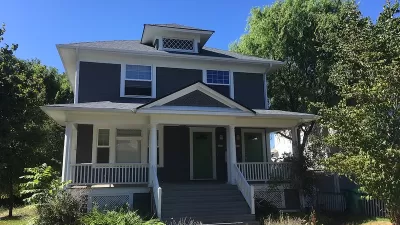A bill that seemed like it could be a casualty of a bitter partisan feud managed to squeak under the wire. With Governor Kate Brown's signature, single-family zoning will be prohibited throughout the state of Oregon.

[Updated: July 1]
Oregon is the first to eliminate single-family zoning, making history this week as the State Senate approved House Bill 2001, which now heads to Governor Kate Brown.
Eliot Njus reports that the bill overcame the drama surrounding the State Senate in recent weeks, and survived a frantic race to approve legislation before the constitutionally mandated end of the legislative session, which would have been a death knell for the bill. The bill notably had support from both sides of the aisle, unlike the climate bill that inspired the Republican walkout the preceded the frantic finish.
Njus provides the following summary of the bill's historic statewide planning reform:
It will allow duplexes, triplexes, fourplexes and “cottage clusters” on land previously reserved for single family houses in cities with more than 25,000 residents, as well as smaller cities in the Portland metro area. Cities with at least 10,000 residents would be required to allow duplexes in single-family zones.
Njus also describes next steps for the implementation of the law, after Governor Kate Brown's expected signature:
Though the bill contains an emergency clause, only elements of the bill intended to prepare for the density mandate would take effect upon its passage. The bulk of the provisions wouldn’t take effect until 2020, with the extra time intended to allow city planners to revise their zoning code.
FULL STORY: Bill to eliminate single-family zoning in Oregon neighborhoods passes final legislative hurdle

Planetizen Federal Action Tracker
A weekly monitor of how Trump’s orders and actions are impacting planners and planning in America.

Chicago’s Ghost Rails
Just beneath the surface of the modern city lie the remnants of its expansive early 20th-century streetcar system.

San Antonio and Austin are Fusing Into one Massive Megaregion
The region spanning the two central Texas cities is growing fast, posing challenges for local infrastructure and water supplies.

Since Zion's Shuttles Went Electric “The Smog is Gone”
Visitors to Zion National Park can enjoy the canyon via the nation’s first fully electric park shuttle system.

Trump Distributing DOT Safety Funds at 1/10 Rate of Biden
Funds for Safe Streets and other transportation safety and equity programs are being held up by administrative reviews and conflicts with the Trump administration’s priorities.

German Cities Subsidize Taxis for Women Amid Wave of Violence
Free or low-cost taxi rides can help women navigate cities more safely, but critics say the programs don't address the root causes of violence against women.
Urban Design for Planners 1: Software Tools
This six-course series explores essential urban design concepts using open source software and equips planners with the tools they need to participate fully in the urban design process.
Planning for Universal Design
Learn the tools for implementing Universal Design in planning regulations.
planning NEXT
Appalachian Highlands Housing Partners
Mpact (founded as Rail~Volution)
City of Camden Redevelopment Agency
City of Astoria
City of Portland
City of Laramie





























